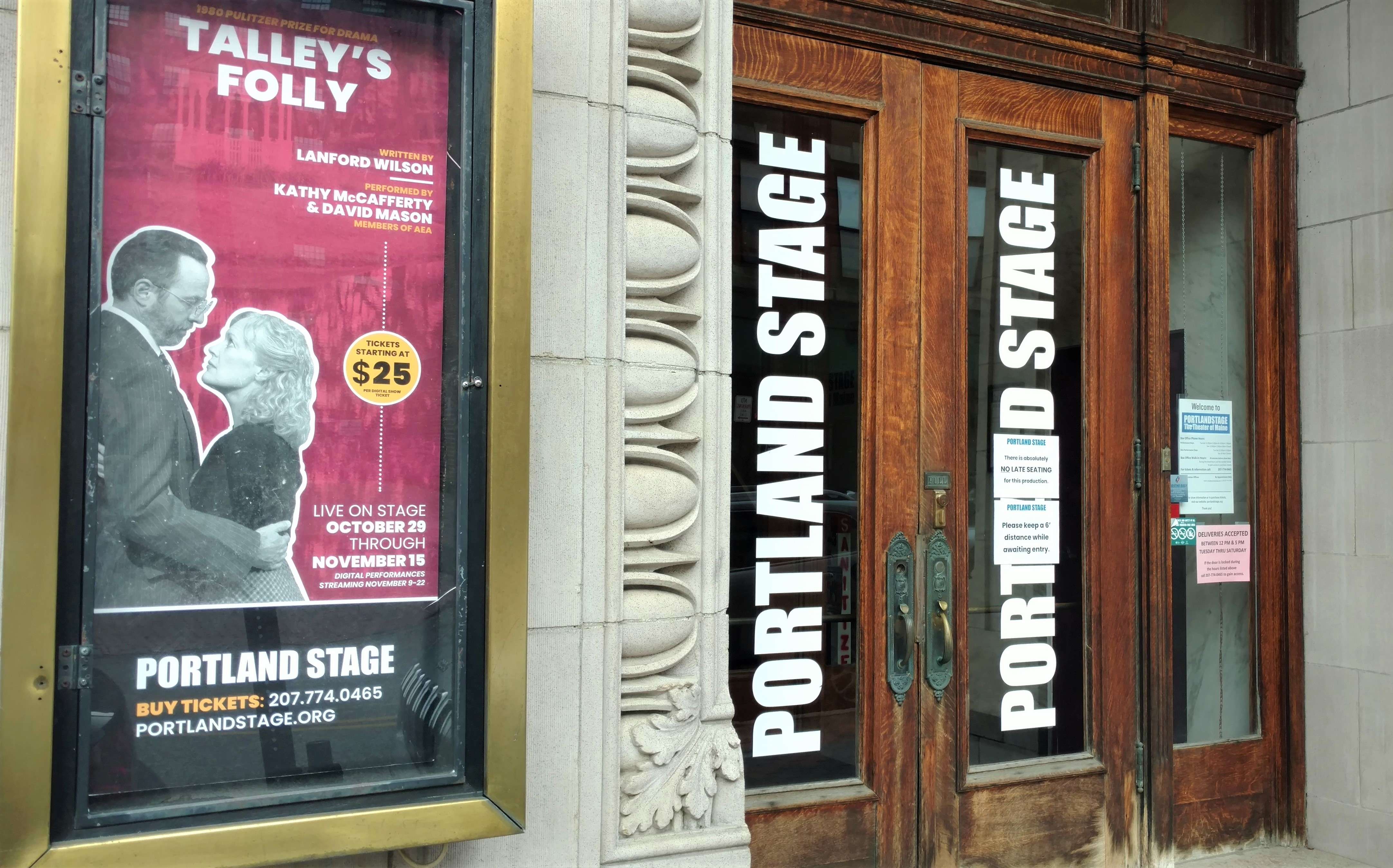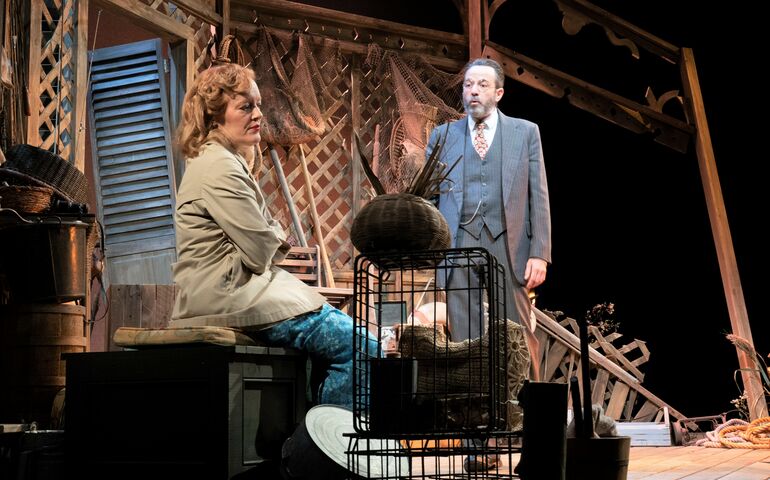
Maine theaters say the show must go on. But amid COVID-fostered union spats, will it?
 Courtesy / Portland Stage Co.
Kathy McCafferty and David Mason perform "Talley's Folly," a Pulitzer Prizing-winning drama now entering its third week of live production at Portland Stage Co.
Courtesy / Portland Stage Co.
Kathy McCafferty and David Mason perform "Talley's Folly," a Pulitzer Prizing-winning drama now entering its third week of live production at Portland Stage Co.
At Portland Stage Co., the curtain is up, after many thought it had come down for the last time.
Despite the pandemic — and contentious dealings with a labor union — the professional theater company is now performing “Talley’s Folly,” a romantic comedy that won the 1980 Pulitzer Prize for Drama.
Portland Stage debuted its production of the play Oct. 29, and it runs to Sunday, with a digital version streaming until Nov. 22.
To keep coronavirus-safe, Portland Stage limits onsite attendance to 48 people inside its 288-seat downtown performance space. Audience members and staff wear protective face masks, and the theater follows a host of exacting public health guidelines.
The play itself was selected because it requires only two actors, Artistic Director Anita Stewart told Mainebiz. In the Portland Stage version, actors David Mason and Kathy McCafferty also happen to be married, which reduces concerns about social distancing.
Reviews of the Maine show have generally been positive. But what’s really drawn raves — including from national television network PBS — is that the theater company, or any theater company, is mounting a live show at all.
In the spring, COVID-19 and resulting public health restrictions forced Maine’s three dozen or so live theaters to go dark. Most still are.
"One night we were performing for audiences, and the next night we were shut down," recalled Stewart in an interview. "It was a pretty drastic screech to a halt."
The state has gradually allowed theaters to reopen under rules set by the Department of Economic and Community Development and the Maine Center for Disease Control and Prevention. But there are other rules, too.
Portland Stage is one of five Maine professional theater companies that contract with the country’s primary union for actors and stage managers, New York City-based Actors’ Equity Association. Portland Stage is the only one that’s received permission from the union to resume performance in front of an audience, and one of only 14 Equity theaters nationwide to get the green light.
Equity represents 51,000 thespians, including Mason and McCafferty, and contracts with hundreds of theaters. While a small number of roles in Equity theaters sometimes go to non-union members, the companies are basically closed shops. The powerful union negotiates wages, benefits, work conditions, and even COVID precautions.
Not every theater is happy with the arrangement.
In fact, eight Equity theaters across the country have recently chosen to reject Equity’s pandemic protocol in favor of their own. The renegade companies include the internationally distinguished American Shakespeare Center in Virginia and New Jersey's Surflight Theatre, which has been an Equity producer for 20 of its 70 years.
The union has shunned these companies, saying they are no longer Equity producers and urging the public to call them out via social media.
“Shamefully, amid the COVID-19 pandemic, some theaters have decided to abandon their commitment to the members of Actors' Equity,” the union says on its website. “These producers have decided to water down their health and safety standards by no longer using Actors’ Equity agreements.”
An Equity spokeswoman declined requests by Mainebiz for further comment, and instead referred to a news release issued in May about the union’s public health guidelines for the pandemic.
“Any employer who wants to begin theatrical productions needs to have a comprehensive plan in place that protects not just the actors and stage managers, but ensures that everyone who works in the theater has a safe workplace,” Equity Executive Director Mary McColl said in the release.
At Portland Stage, Stewart said she’s been dealing with Equity’s demands for COVID precautions since the day her theater shut down. Working out a deal with the union in order to stage “Talley’s Folly” has been “a challenge, to say the least.” She’s currently trying to obtain a contract that would allow an actor to perform a one-person version of “A Christmas Carol” for the holiday season.
“It’s been a nail-biting thing,” she told Mainebiz. And she sympathizes with the blacklisted theaters.
“I understand why some producers have said, ‘I’m doing my own thing.’ I’m aware of other organizations that are having those conversations right now.”
The show must go on
Arts organizations, like many businesses in Maine, have been crippled by the pandemic. Performing arts groups have had an especially tough time. Their livelihood, by definition, relies on a virus breeding ground: people congregating, often in crowded indoor theaters for extended periods of time.
Maine regulations currently limit the size of audiences, like other gatherings, to 50 people. Actors and stage hands are counted separately, as long as they remain at least 14 feet from the audience. And the state mandates dozens of other precautions — including ventilation standards and 25 other requirements for the venue itself.
Across the country, similar rules have led to shutdowns and a projected 33% revenue loss for 2020 in the $6 billion theater industry. Still, some performance organizations are finding a way to get by.
Opera Maine, the state's only professional opera company, had to cancel plans for a July production of "The Flying Dutchman" at Merrill Auditorium in Portland City Hall. But by September the company managed to stage a "Garden Serenade" performance of operatic favorites, held outdoors in Falmouth.
The serenade, which coincidentally featured just two singers who happened to be married, drew 50 socially distanced music lovers to its first show.
"We realized that despite the pandemic, there was a pent-up demand for live musical performance," Executive Director Caroline Koelker told Mainebiz. "And so we worked carefully, following the CDC's public health guidance, to come up with a way of sharing opera with our community. We intended to host one Garden Serenade, but we sold out quickly and added a second recital."
Nearby in Falmouth, a professional drama company has also staged performances. Audiences at the Footlights Theatre are limited to 25, and the current show, "RBG," has only actor, who performs behind a glass partition.
There's plenty of disinfecting, required mask-wearing and other safety practices. On its website the theater says it's "going above and beyond the Maine state restrictions and guidelines to provide a safe and healthy experience."
Still, putting on even a small show is tough in the new normal.
"It’s been beyond stressful," Footlights says on its site. "We can cover our expenses and keep the theater from closing with a seating capacity of 25. There will not be any extra money to save, but at least the doors will not close."
Safeguards and security guards
Back at Portland Stage, Stewart and her team have been wrestling with similar challenges.
The company has a $2.5 million annual budget, and took a loss of about $1 million from its canceled performances. Over the summer, it considered a variety of strategies for future operations.
Complicating them all was how to comply not only with state regs, but with Equity’s safeguards against coronavirus.
Portland Stage first put a protocol together for the union’s review in August. After that, Stewart said, “we went around the bend a million times. I know their intention is to make sure they’re taking care of their members, but it was exhausting.”
The union’s COVID requirements fill a 21-page worksheet, and go further than those from the state. There’s even a requirement that housing, which producers frequently offer Equity actors, must come with security guards trained to enforce COVID restrictions.

For many producers, especially those far from Broadway, the list is impractical. But there’s little wiggle room.
‘’Equity has historically had a tight rein, and there’s always been the threat — they can shut you down,” Stewart said.
At another Equity company, Maine State Music Theatre in Brunswick, Artistic Director Curt Dale Clark is “trepidatious” about his plans for four main performances in 2021, plus a half dozen smaller events.
In April, the company canceled its 2020 shows for the first time in its 62-year history. The cancellation was followed by ones at the three other Equity houses besides Portland Stage: Ogunquit Playhouse, the Public Theatre in Lewiston, and Opera House Arts in Stonington.
MSMT employs as many as 240 actors, stage crew, front-of-house staff and others, primarily during the summer, when it generates 80% of revenue for a $5 million budget.
But Clark is worried about how “variables not in our control” will affect next season. Besides the pandemic itself, factors such as changing state regulations and the rules established by Equity could determine where, when and how Maine State goes into production again.
“Our current plan is to do the season as is, but what are the odds that we’ll do it exactly that way? Probably under 50%,” Clark told Mainebiz.

So far, he’s had limited communication with Equity about resuming performances. But he’ll need to work out a contract with the union in coming weeks.
“The reality is, if we don’t get something from [Equity] soon, we’re not going to have the answers in time to do things right,” Clark said. “What we do takes months of preparation. If the rules and the laws don’t change, something’s got to give.”
Clark, who not only leads MSMT’s productions but is an actor and an Equity member since 1989, said he would be reluctant for the company to stop working with the union. But he's taking a wait-and-see approach.
“We would do everything we can to stay with the union, until the point when it would cause us to go under,” he said. “And currently Actors’ Equity is not being reasonable. Even the members think [the rules] are overkill. The union is acting out of fear.”










0 Comments